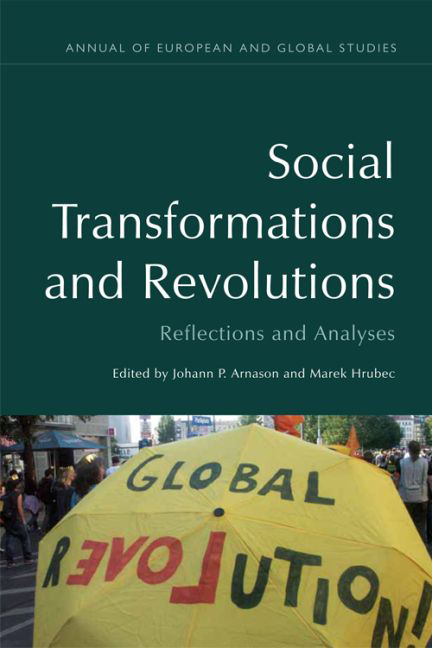Book contents
- Frontmatter
- Contents
- 1 Introduction
- 2 A Trialogue on Revolution and Transformation
- 3 Revolutions, Transformations, Civilisations: Prolegomena to a Paradigm Reorientation
- 4 The Transformation of Capitalism and the Limits of Democracy
- 5 From Civilisational Crisis to Revolutionary Transformation?
- 6 Environmental Crisis and Political Revolutions
- 7 Communists and Social Democrats in the Hungarian Soviet Republic
- 8 Can Political Participation Become Dangerous for Democracy? Participatory Experiences in Brazil and the Reactions Against Them
- 9 Hidden Revolutionary Processes in 1990s India?
- 10 Matching Reforms of Political and Economic Systems of China
- Notes on the Contributors
- Index
9 - Hidden Revolutionary Processes in 1990s India?
Published online by Cambridge University Press: 15 September 2017
- Frontmatter
- Contents
- 1 Introduction
- 2 A Trialogue on Revolution and Transformation
- 3 Revolutions, Transformations, Civilisations: Prolegomena to a Paradigm Reorientation
- 4 The Transformation of Capitalism and the Limits of Democracy
- 5 From Civilisational Crisis to Revolutionary Transformation?
- 6 Environmental Crisis and Political Revolutions
- 7 Communists and Social Democrats in the Hungarian Soviet Republic
- 8 Can Political Participation Become Dangerous for Democracy? Participatory Experiences in Brazil and the Reactions Against Them
- 9 Hidden Revolutionary Processes in 1990s India?
- 10 Matching Reforms of Political and Economic Systems of China
- Notes on the Contributors
- Index
Summary
Introduction
THE YEAR 2014 was an especially turbulent one on the Indian political scene. From the Aam Aadmi Party's forty-nine-day rule in the Delhi State Assembly to the landslide victory of the Bharatiya Janata Party (BJP) in the general elections in May, routines of the political system have been broken and its patterns overturned. By capturing the public imagination and creating a new voting bloc, the Hindu nationalist BJP managed to become the first political party since 1984 to secure a clear parliamentary majority with 31 per cent of the vote and 282 out of 543 seats in the Lok Sabha. Ideologically, the success of the BJP is even more important: it marks the end of Nehruvian secularism and socialism as the founding principles of an independent democratic India, and their replacement with the more exclusive concepts of cultural nationalism and economic neoliberalism.
The aim of this chapter is not to analyse the immediate causes of the BJP's electoral success, but rather to explore the conditions which enabled Narendra Modi to grab power in such a triumphant way. Can we interpret his achievement not only as a victory of a well-elaborated political campaign but also as a result of deeper transformational processes in Indian society which have taken place during the last two decades? In this chapter we shall explore the mutually reinforcing processes of economic neoliberalisation, cultural nationalism and low-caste assertion which occurred in Indian politics in the early 1990s. Although none of them has brought a true revolutionary change in organisational structures, could we consider them as a trigger of the rearrangement of Indian polity and society, crowned by the recent electoral successes of Narendra Modi's BJP? Is it even possible to perceive these processes through the lens of the Gramscian concept of passive revolution, declared inapplicable by Sudipta Kaviraj in his classic essay almost thirty years ago?
Multiple revolutions
Since independence, India has gone through several transformational processes which have altered the social order in truly revolutionary ways and have been described in various terms in Indian historiography. Green revolution is the first of these, referring to the changes that took place in Indian agriculture during the 1960s.
- Type
- Chapter
- Information
- Social Transformations and RevolutionsReflections and Analyses, pp. 168 - 183Publisher: Edinburgh University PressPrint publication year: 2016



